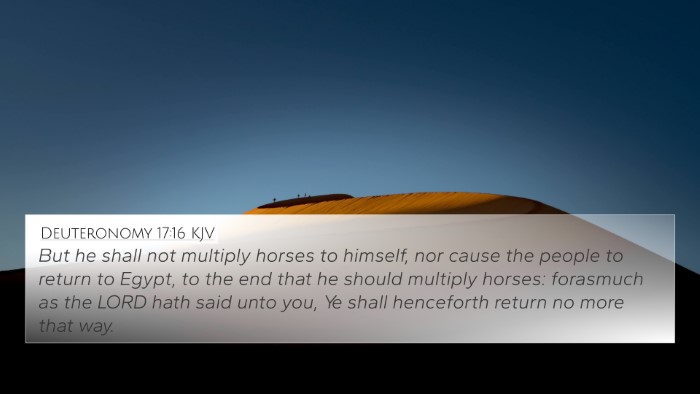Understanding Numbers 14:4
Verse: "And they said one to another, Let us make a captain, and let us return into Egypt." (Numbers 14:4)
This verse captures a moment of discontent among the children of Israel as they face the challenges of entering the Promised Land. Their desire to appoint a leader to take them back to Egypt reflects a profound lack of faith and trust in God's plan.
Key Themes and Insights
- Leadership and Rebellion: The people express a desire for leadership that aligns with their own fears. Instead of following Moses and Aaron, they seek a captain to lead them back to Egypt.
- Faith and Fear: Their decision to abandon the journey to the Promised Land reveals their fear overshadowing their faith in God's promises.
- Retrospective Yearning: The longing to return to Egypt symbolizes a general human tendency to revert to familiar, albeit oppressive, circumstances, especially in times of uncertainty.
Commentary Insights
Matthew Henry's Commentary: Matthew Henry elucidates that the Israelites’ proposition was born out of their disbelief in the providence of God. Their inclination to return to Egypt illustrates a lack of gratitude for their liberation and a willingness to embrace slavery again over the trials of faith.
Albert Barnes' Notes: Barnes notes that the decision to appoint a captain represents a critical turning point. Instead of seeking divine guidance, the people rely on human leadership, marking a departure from reliance on God.
Adam Clarke's Commentary: Clarke emphasizes the gravity of this moment, as it demonstrates a widespread discontent that could have dire consequences for the nation. Their desire for a captain highlights their spiritual decline and forgetfulness of God's mighty acts.
Cross-Referencing Biblical Texts
Numbers 14:4 has various cross-references that deepen our understanding of this pivotal moment in Israel's journey:
- Exodus 16:3: The Israelites lamenting their circumstances in the wilderness, wishing for the comforts of Egypt.
- Deuteronomy 1:26-28: The recounting of Israel's failure to enter the land due to fear and disbelief.
- Psalm 106:24-25: Reflection on Israel's lack of faith and wish for Egypt, highlighting their forgetfulness of God's deliverance.
- Hebrews 3:19: A New Testament reminder that unbelief was the reason the Israelites did not enter the Promised Land.
- Jeremiah 42:13-16: A parallel narrative where a remnant of Israel desires to return to Egypt rather than trust God's plan.
- John 6:66: The New Testament mentions disciples turning back, similar to the Israelites' decision, reflecting a loss of faith amidst challenges.
- Matthew 11:28-30: Jesus' call to rest in Him parallels the need for reliance on divine guidance, contrasting with the Israelites' choice.
Thematic Connections
Drawn from the insights of the verse, several thematic Bible verse connections can be explored:
- Liberty vs. Bondage: The tension between freedom in faith and the familiar bondage of Egypt.
- Leadership and Trust: The importance of godly leadership as opposed to human-centric guidance.
- Faith's Necessity: The vital role of faith in navigating life's challenges.
- Historical Reflection: The recurring biblical theme of longing for the past despite its hardships.
Conclusion
Numbers 14:4 serves as a profound reminder of human tendencies to grapple with faith in the face of adversity. The desire to return to Egypt underscores a critical lesson about trust, leadership, and the danger of allowing fear to dictate actions. In the broader spectrum of scripture, it stands as a warning and an invitation to engage in inter-biblical dialogue, drawing connections and reflections that resonate throughout the biblical narrative.
Further Study
For deeper insights on the themes presented in this verse, utilizing tools for Bible cross-referencing can unveil how these ideas resonate across both Old and New Testament contexts. Methods such as the use of a Bible concordance or a comprehensive Bible cross-reference guide can aid believers of all levels in their spiritual journey.










